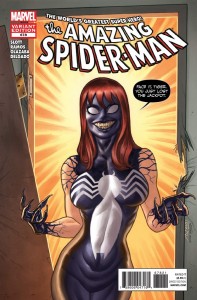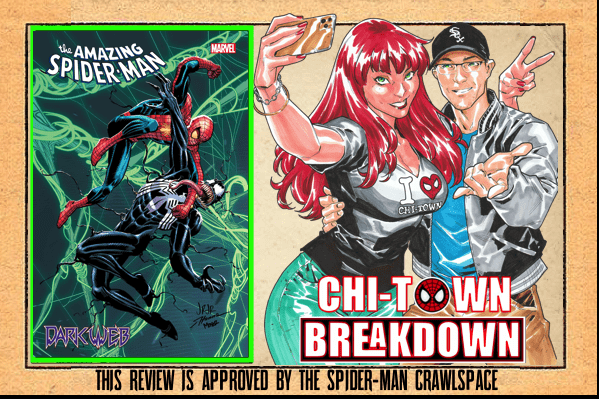 You know what? A little Spider-Man junk food every now and then never hurt anybody.
You know what? A little Spider-Man junk food every now and then never hurt anybody.
The Amazing Spider-Man #678: I Killed Tomorrow Part 1 of 2 – Schrodinger’s Catastrophe
Words by Dan Slott
Art by Humberto Ramos
Inks by Victor Olazaba
Colors by Edgar Delgado
Letters by Joe Caramgna
Don’t anybody freak out. This horrendous alternate cover has even less to do with the story than most ASM covers have lately. There is no symbiote-covered Mary Jane, no implication of such a thing, and in fact no Mary Jane at all. Who on earth thought this up and who actually let it out the door? Weird.
But as for the title of this issue, I smiled a little: “Schrodinger’s Catastrophe” (sic). Why (sic)? Well, it should be “Schrödinger.” Duh.
I’m just enough of a geek to be amused by that title, because the question posed by that often-cited but rarely understood thought experiment involving cats is surprisingly appropriate. It never gets mentioned in the issue — which is to Slott’s credit, I think — but the question that haunts every page after the initial setup is, did Peter make “bad Tuesday” real by observing it?
If you’re not familiar with the thought experiment this issue is named after, I’m not going to go into details here because a) I’m not a physicist and would probably screw something up, and b) it would take up the whole review. So to truncate it as best as I can, a cat exists inside a box where quantum improbability may or may not set off a device that will blow up the cat. Conventional quantum mechanics suggests (according to a possible interpretation, this is by no means a proven fact) that when there are multiple states possible in this way, both states exist simultaneously until the outcome is observed. So, the difficulty of the cat scenario is: does this mean the cat experiences being both alive and dead at one time?
At any rate, it’s a lot more complicated than that and if anyone here whose physics is actually academic wants to expand on or correct anything I’ve said feel free to do so in the comments. I just can’t resist getting into this stuff because I’m a philosophy major, so a whole issue that’s wrapped up in a question like this really gets me going.
Does that mean that this is a really heady story with all kinds of philosophical content? Well no, actually it’s extremely lightweight Back to the Future material. But just because Slott doesn’t squeeze much out of his own quantum physics reference doesn’t mean I can’t!
 Ugh! I hate all this pre-destiny crap!
Ugh! I hate all this pre-destiny crap!
Yeah, me too. Somehow Madame Web always manages to catch me off guard when she shows up these days, even though I really ought to be used to it by now. I’m a bit torn on her use in this story, though. On the one hand, Slott needs to find another plot device and fast. It’s one thing to have a mystical psychic lady appear and constrain options with her future seeing magic every now and then, but it’s starting to get ridiculous. If he needed a way to make the Avengers not show up, he could have at least fallen back on the convenient old “everybody is already busy fighting some other huge threat.” At least we haven’t heard that one since Nothing Can Stop the Juggernaut. (Or maybe we have and I’ve forgotten… but at any rate I’d welcome anything other than “don’t do what would make sense because Madame Web said.”
But, the part of me that wants to make this all metaphysical actually isn’t terribly bothered by her this time, because we’re already doing one of those split timeline stories and she throws another interesting wrench into the works. You’ve already got two possible timelines, one that we can assume was “created” when Peter stepped through the tomorrow door, and one where he never had — presumably the goal is to uncreate the one where New York gets destroyed by attempting to reconstruct the old one as closely as possible. But then Madame Web comes into the picture and says not to bring anyone else in. That implies that she sees another possible timeline, one where the Avengers and the FF get involved, and the results of that are bad too. But does her foresight imply that timeline already exists? How does it differ from Peter “creating” another timeline by walking through a sci fi door? Madame Web hasn’t actually been to any alternate futures. So if we are to assume that her powers are always accurate — which we don’t know for sure, of course, and that’s another complication — what’s the difference between an observed alternate timeline and a known but unobserved one?
Okay, so maybe this is getting a little out there for a review. But this kind of stuff is important to us Spider-Man fans right now: for many of us, Peter’s currently living in a not so desirable alternate timeline as it stands. How real is it, anyway, and can fancy science doors or mystical spider ladies or maybe a combination of the two ever fix it? And if so, do we want them to at this point — or has this reality taken over as the true one?
 That’s the plan. I’ll get Spider-Man!
That’s the plan. I’ll get Spider-Man!
The strongest part of this issue, regardless of any metaphysical quandaries underlying it, is watching Spider-Man be Spider-Man as he and Grady try to retrace his future self’s footsteps. It works especially well because the viewer has a suspicion the whole time that there’s got to be more to it, and it can’t quite be as black and white as that newspaper suggests (yep, I did it on purpose and I thought it was funny). Plus, this is the Spider-Man I know again. He’s a guy who can cross New York in a few hours doing everything from delivering a baby to catching a no-name super villain and denying him his grand explanation of his plan because there’s just no time. I like reading about that Spider-Man, and I like the way Slott brings him to me in stories like this one.
I actually didn’t even mind Ramos’s art too much in this issue. Maybe I’m getting used to it, but I think he’s actually getting a bit more solid — there weren’t any panels here where I felt the perspective or sequencing was jarring, and his anatomy doesn’t strike me as nearly so excessively cartoonish as it often has. I wonder if I’m getting too soft on the guy?
And while I’m sure that most readers aren’t getting the kind of philosophical nonsense I am out of this plotline, that’s quite alright. It’s actually very basic and mostly brainless science fiction, but it’s funny, quick and engaging. There’s enough setup involved in the cliffhanger to keep me curious for next time. One of these days I’m really going to be starving for a writer who can tackle the serious side of Spider-Man without making me want to facepalm myself unconscious, but I’ve started to wonder if Marvel is employing any (actually, that’s not true, they are: I’ve secretly been hoping Christos Gage will one day succeed Slott, but that’s for another time). In the mean time, I’m happy to take these short and sweet escapades that could have more or less happened during any Spidey status quo.
Pros:
- It’s funny, it’s got a lot of content, and it’s Spider-Man.
- Well, if you’re me, you can sit around and ponder it forever!
Cons:
- Nothing major — Ramos haters be warned it’s Ramos, Slott haters be warned it’s Slott, Spielburg haters be warned it’s Back to the Future.
- Shut up, Julia.
Grade: B








The variant cover just makes me think there’s a Venom-centric event coming up…